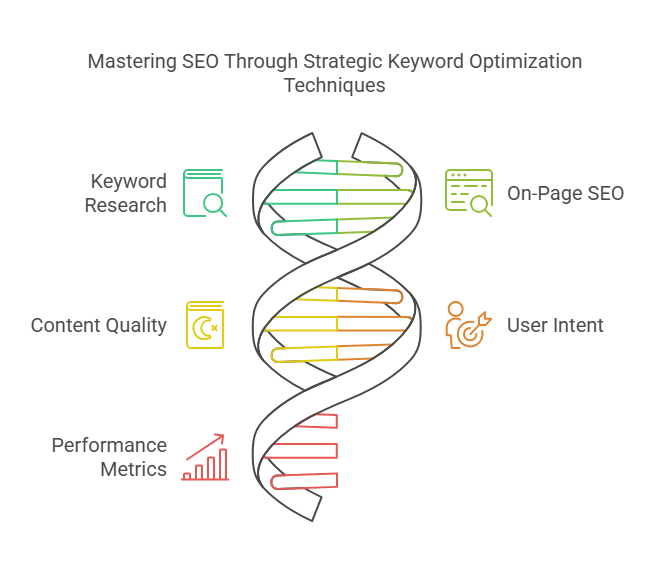Effective keyword ranking is at the heart of any successful digital marketing strategy. It determines how well your website performs on search engine results pages (SERPs), influencing traffic, engagement, and conversions. This guide breaks down Google keyword ranking in simple terms, offering actionable tips to help you boost your website google rankings and grow your online presence.
What is Google Keyword Ranking?
Google keyword ranking refers to the position of a specific keyword or phrase in Google’s search results. For example, if your website ranks first for the keyword “Atlanta web design,” it means your site appears at the top when someone searches for that term.
Ranking high on Google is critical because:
- Most users rarely click beyond the first page of results.
- Higher rankings increase visibility, organic traffic, and credibility.
How Does Google Determine Keyword Rankings?
Google uses a combination of algorithms and ranking factors to determine where your website appears in search results. Key factors include:
- Relevance: Does your content match the user’s search intent?
- Quality Content: Well-researched, engaging, and valuable content ranks higher.
- Backlinks: Websites with high-quality backlinks gain authority and improve rankings.
- User Experience (UX): Fast-loading pages, mobile responsiveness, and easy navigation impact rankings.
- Keyword Optimization: Proper use of keywords in your content, titles, meta descriptions, and headers is essential.
Also Read:- Affordable SEO Services in Atlanta
Steps to Improve Your Google Keyword Ranking
1. Conduct Keyword Research

Start by finding the right keywords for your business. Tools like Google Keyword Planner, SEMrush, and Ahrefs can help you:
- Identify high-volume, low-competition keywords.
- Discover long-tail keywords for niche targeting.
- Understand search intent behind specific keywords.
For example, instead of targeting the generic term “shoes,” aim for “best running shoes for women in 2025.”
2. Optimize Your Content
Effective optimization ensures that your website ranks well for your target keywords.
- Include Keywords Naturally: Use your primary and secondary keywords in titles, headers, meta descriptions, and throughout the content. Avoid keyword stuffing.
- Use Alt Text for Images: Include descriptive keywords in your image alt tags to improve visibility in image search.
- Update Content Regularly: Refresh old blog posts and pages with updated information and new keywords.
3. Create High-Quality Content
Content is king when it comes to ranking on Google.
- Focus on User Intent: Write content that directly answers user questions or solves their problems.
- Long-Form Content: In-depth articles tend to perform better, providing value and increasing dwell time.
- Use Multimedia: Add videos, infographics, and images to make your content more engaging.
4. Improve Your Website’s SEO

Technical SEO plays a crucial role in keyword ranking.
- Optimize Page Load Speed: Fast-loading websites rank higher. Use tools like Google PageSpeed Insights to check and improve speed.
- Mobile-Friendly Design: Ensure your website is responsive and works seamlessly on all devices.
- Use Internal Links: Link to other pages on your site to improve navigation and distribute link equity.
- Secure Your Site with HTTPS: Google favors secure websites with SSL certificates.
5. Build Quality Backlinks
Backlinks from reputable sites signal to Google that your website is authoritative.
- Guest Posting: Write articles for reputable websites in your niche to earn backlinks.
- Broken Link Building: Reach out to website owners and suggest replacing broken links with links to your content.
- Create Shareable Content: Publish unique and valuable resources, such as research reports or guides, that others want to link to.
6. Use Google Tools
Leverage Google’s tools to monitor and improve your rankings.
- Google Search Console: Track keyword performance, identify errors, and optimize your site.
- Google Analytics: Understand user behavior and traffic sources.
- Google Trends: Stay updated on trending topics and seasonal keyword opportunities.
7. Monitor and Adjust Your Strategy
SEO is an ongoing process, and monitoring your performance is key to success.
- Track Your Rankings: Use tools like SEMrush or Ahrefs to monitor keyword positions over time.
- Analyze Competitors: Identify gaps in your strategy by analyzing competitor keywords and tactics.
- Test and Optimize: Experiment with different keywords, headlines, and content formats to find what works best.
Common Mistakes to Avoid
While improving your keyword rankings, steer clear of these pitfalls:
- Keyword Stuffing: Overloading your content with keywords can hurt your rankings.
- Ignoring Mobile Users: A mobile-friendly site is non-negotiable in today’s digital landscape.
- Poor Quality Backlinks: Links from spammy or irrelevant sites can harm your SEO efforts.
- Neglecting Local SEO: If you target local customers, optimize for location-based keywords like “web design services near me.”
Why is Keyword Ranking Important?
Ranking well for relevant keywords drives organic traffic, which is cost-effective and sustainable compared to paid ads. It also positions your business as an authority in your industry, building trust with your audience.
Conclusion
Improving your Google keyword ranking requires a blend of research, optimization, and ongoing effort. By focusing on high-quality content, technical SEO, and user experience, you can achieve higher visibility and attract more potential customers.
If you’re ready to take your keyword strategy to the next level, Orbit InfoTech is here to help. We specialize in SEO services that drive measurable results, ensuring your business thrives in an increasingly competitive digital landscape. Contact us today to boost your Google keyword rankings and grow your online presence!
 Our Gateway to Insightful Blogging Exploring Ideas, Sharing Knowledge, Inspiring Minds
Our Gateway to Insightful Blogging Exploring Ideas, Sharing Knowledge, Inspiring Minds



